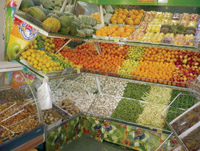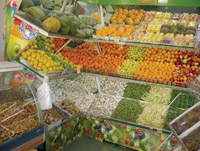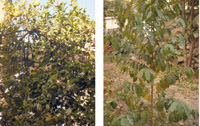
Eating from your own garden [Archives:2009/1223/Last Page]
January 8 2009
 |
 |
Agriculture provides around 20 percent of the total GDP according to 2007 statistics, with an average annual growth of five percent. Around half of the country's employment is hosted in the agriculture sector, and majority of this workforce is comprised of women.
Because of the constant immigration to the cities, Yemenis take less interest in their land or in farming generally. Yet some take this interest with them to the cities and try to grow plants wherever they can.
“My mom was the one who insisted on growing some plants in our backyard. She says she misses her farm in our village. She is the only one taking interest in the gardening,” said Buthina Abdu from Sana'a.
In Sana'a, the architectural design does not allow much for gardening, especially with the increasing demand on real estate. Many farms are being transformed into residential building and offices, leaving less space for greenery.
Some people who are interested in gardening overcome this problem by using small containers to plant decorative plants on the staircases or window ledges. Some are even more creative and make their own gardens on the roof tops.
Ola Hussien explains that her brother split a water tank into two, took it to the roof, and filled it with soil. Now they grow tomatoes, potatoes, and mint, among other plants used for decoration or for a good scent such as jasmine.
“My brother grows onion in his garden and he brings me some every time he visits. I wish I could have my own land instead of living in an apartment – I would have grown lots of fruit and vegetables, and even own livestock,” said Mahmoud Mohammed.
There are various problems that stand against gardening in Sana'a. The issue of space is one of the main complaints interested Yemenis have. Then comes the problem of skill in using appropriate fertilizers, growing the right plants in the right season, or birds eating the fruit.
More so, most of the people who do have some sort of garden often use it for decoration and just for the interest in greenery instead of consumption.
“We have many trees in our garden: lemon, coffee, passion fruit, and an apple tree. We also grow small plants such as mint, lavender, and roses,” said Izdihar Abdulkarim.
However, she admitted her family would rather buy apples from the market rather than eat from the garden because their apple tree's apples are not as sweet.
“We never buy lemon or mint leaves as they grow nicely in our garden. The rest we buy from outside,” she said.
On the national level, major agricultural products include fruits, vegetables, and cereals, but production is rarely sufficient to meet domestic demand. As a result, Yemen continues to import most of its food.
Even during cold weather when the food products are quite expensive, the thought of going local and growing some of fruits and vegetables at home is not really taken seriously by many Yemenis who have gardens.
Although the in-house produce is guaranteed to be organic and healthier nutrition wise, it is generally smaller than and not as tasty as those bought from large scale farms or imported from abroad. The exception is cultivating qat because it is easier to grow, and people who grow qat in their own gardens take great care and pride in it.
Awareness of the dangers of chemicals used in agriculture and the importance of organic food is not common in Yemen. This is perhaps why home gardening in Yemen is not advocated, while almost every environmental group in developing countries is warning that store-bought produce is loaded with petro-chemical pesticides that build up in the human body. Medical reports blame these chemicals for many illnesses, from autism in children to cancer at all ages.
When asked whether Yemenis eating from their own gardens would pose as a threat, fruit and vegetable venders dismissed the notion completely.
“This is the farmers' job; they do it for a living. Others do it as a hobby, so they will always buy their fruits and vegetables from the market,” said a fruit vendor on Hadda street.
Most of the vegetables grown for consumption are those used in small quantities or occasionally. Green mint was the most common plant grown. Scented plants such as lavender, basil, and jasmine follow, along with some types of flowers.
Dedicated gardeners grow tomatoes, parsley, onion, eggplant, radish, lettuce, and corn. Those with larger space plant fruit trees such as pomegranate, apple, lemon, orange, fig, and guava. They usually eat from the trees while the fruits or vegetables are in season, but most of the time it is the birds or the bugs that get the lion's share of the garden produce.
——
[archive-e:1223-v:16-y:2009-d:2009-01-08-p:lastpage]


